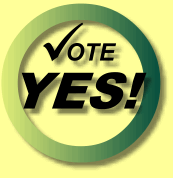
- Home
- Issues
•Background
•News
•FAQs
•Did you know
•Letters
•Photos
•Counterpoint - Links
- How to help
- Contact us
The Lindsay Post is running a weekly series of questions, with answers by both the "Yes" and "No" sides of the issues.
Question #19:
How should the provincial government participate in public information sessions leading up to the November referendum?
How should the provincial government participate in public information sessions leading up to the November referendum? Well, we suppose it could bake cookies. But probably the government should stick to what governments do best: cut a cheque.
The referendum on de-amalgamation is a provincial initiative. And while the referendum question will be on the municipal election ballot, it is still a provincial question. The fact that our City Council invited the Minister of Municipal Affairs to hold the referendum doesn't alter the fact that the provincial government has some responsibility here.
The Max Radiff panel was created to make recommendations to the provincial government. One of the recommendations was that Queen's Park should hold four public information sessions. For all of these reasons it would seem logical for the provincial government to pay the costs associated with the information sessions. So far, they have not indicated a willingness to do so.
However, since we are finally being given the chance to vote on our own destinies, the real beneficiaries of the referendum are the people of this community. If the provincial government won't pay for information sessions, we should probably take some responsibility for, pride in, and ownership of, the process ourselves. Here are some alternatives:
VOCO (Voices of Central Ontario) has four years' worth of experience holding town-hall meetings. VCTC (Victoria County Taxpayers Coalition) has done it before and can do it again. So can The Victoria County "Yes" Campaign.
I'm sure the Kawartha Lakes Supporters could organize a meeting, as could a single-purpose alliance of both the "Yes" and "No" sides.
The Coboconk Legion has offered the use of its hall to hold a public information meeting. We suspect that other Legions would do the same. The Lindsay Daily Post, or Y-92 radio ought to offer their resources, in the spirit of community service, to hold the sessions.
The advantage of these alternatives over a government-sponsored initiative is cost savings. A grass-roots effort wouldn't cost the taxpayers one thin dime; or the many fat dimes that would be spent if the Ontario government was to become involved. Well organized, well advertised, well run, informative town-hall meetings need not be grossly expensive.
The real challenge will be to get both sides of the debate to agree on the format. The "Yes" side would be quite prepared to accept any reasonable proposal. Max Radiff made recommendations for four public information sessions which are acceptable to us provided that a neutral moderator can be found.
Radiff had in mind four debates held in various locations around the City, in which a maximum of four representatives from each of the "Yes" and "No" sides would make a 20 minute opening presentation and then respond, in turn, to written questions from the audience. Each side would be allowed to set up a table to distribute literature and engage in dialogue with the public.
Seems fairly straight-forward. The "Yes" side is ready, willing and able to go at it. All we need is an opponent willing to do the same.